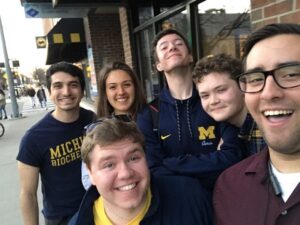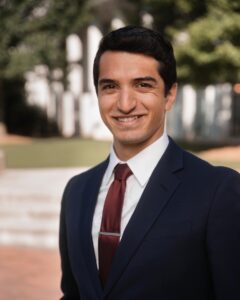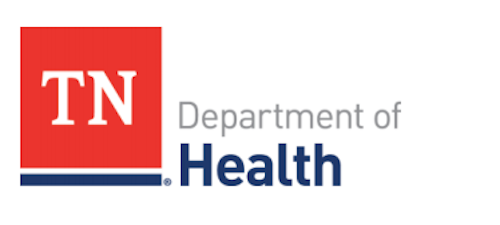By: Tony Mufarreh (to read Tony’s original article visit his blog here)
As a student, I’ve had the pleasure of being a part of several student clubs/organizations. At this point, I swear I’ve done it all: science olympiad, national honor society, track and field, swimming, student government, jazz band, marching band, band council (can never have too much band, right?).
I had the great honor of being elected “leader” of a variety of these groups: Student Representative x 2, Vice President x 3, President x 6, and countless “social media” roles. I’m unsure if the average number of leadership positions the typical professional holds is known, but I would like to formally submit my application to Guinness.
Spending any time in a leadership position (student or professional), inevitably a predecessor has given you the advice to “delegate” tasks. This is, at its core, the idea of distributing the work load, typically done in a top-down fashion. When done right, this can be an invaluable skill. The problem is: it’s not.
Thus, what I call the Theory of Delegation (ToD) was born. Not only is this a framework for delegating effectively, but another tool in your toolbox for becoming a better leader.
Part 0: Assumptions
To use ToD method effectively, we need to establish some context. First, this method should be used when talking with teammates. There’s little reason to be delegating tasks to someone in a different department or institution, unless they are already a member of your group, ensuring constant communication, follow-up, and check-ins.
Second, make sure the person you are delegating the task to is the correct person for the job. This is a bit tricky at times, and more of an art form on the leader’s side, but your goal is to learn what each person on your team is good at. Figure out what they do well, if they have access to the resources to complete the task, and (often most important) do they have the TIME to complete it? More on this in Part 3.
Part 1: Start with WHY
This one is taken and adapted from Start With Why by Simon Sinek. The basic idea is to form how you communicate the task to someone into three essential components: What, How, and Why (also known as the “golden circle”). What is the task? How do they complete the task (i.e. resources needed)? Why is this task important for the overarching mission?

https://www.alexanderjarvis.com/simon-sinek-how-great-leaders-inspire-action-the-golden-circle/
The good news is that you probably already know the answer to all of these questions, however, the order in which you present them is what makes the ToD so powerful. Typically what happens is people talk from the “outside-in”, stating What and How, and either glossing over Why or omitting it completely. Instead, speak from the “inside-out”, starting with Why. This puts the sometimes trivial task into perspective, showing how this one piece fits into the larger puzzle. “What if I don’t know the Why for a task?” Then the task doesn’t fit into you mission as an organization, don’t assign it.
Check out Simon’s Ted Talk for more on this.
Part 2: Be direct
Has this scenario happened before: A boss needs a simple task done that can be done by anyone on the team. Believing everyone is willing and able, they send a mass email to the whole team explaining the task (starting with why, of course), and at the very end they add this tag: “Can anyone do this?” The response? Crickets. Why?
It isn’t a result of people’s unwillingness to help. Simple tasks are simple and in general, we want to help. So what went wrong? Lack of directness. Humans have bias, essentially an unconscious preference for certain things and actions. In psychology, the bystander effect is one such bias. It states that when people are in crowds, we are less likely to assist someone in need because of a flawed assumption: someone else will help.
This is why our boss got crickets from the email. Everyone assumed someone else already took up the charge. The solution to this is quite simple, be direct. Ask a single person directly, no matter how trivial the task may seem. If they are unable, ask someone else. Avoid mass emails or cries for help, we’ll just assume it’s already done.
The index team where the Theory of Delegation was formally born. April 2019
Part 3: One at a time
Different people are different. They require different needs and complete tasks at different rates. Give two people 1 hour, one might finish the task, the other may not. Why? Life happens outside of our control that effects productivity. It is nearly impossible to separate our life from work in this sense. As a leader assigning tasks, you must have a gauge for this timeframe for each person.
How do you get a gauge? Know your people. Know what goes on in their lives, take interest in who they are and be their friend. Not everyone can work at 100% 24/7, so don’t assign your tasks with this assumption. Be flexible, be adaptable, and be available if they cannot complete their task during the given timeframe. The task is important, yes, but being there for your people is how you create resilient teams.
Conclusion
Those are my secrets. The Theory of Delegation has been in development for over 5 years and continually improving. However, keep in mind that, just like leadership, the ToD is an art form and takes time to master. With these introductory tips, you will be well on your way to creating more effective and cohesive teams.
My favorite part of the ToD is this: your team will take note of how you lead. Your methodology, your supportiveness, and your mission for a greater goal will show through, and will be inspiring. Legacy is built into the ToD, teaching future leaders how to work in their own groups, resulting in an explosion of effective, empathetic leaders. I’ve seen it with my own eyes, and I can’t wait for you to see it, too!
You can watch my Presentation on Theory of Delegation to Kappa Kappa Psi, National Honorary Band Fraternity at University of Michigan at this link.
 Anthony (Tony) Mufarreh, MPH (EPI 2021) is currently a first year MD student at Central Michigan School of Medicine. During his time at Rollins, Tony served as Rollins Student Government Association (RSGA) Epidemiology Representative.
Anthony (Tony) Mufarreh, MPH (EPI 2021) is currently a first year MD student at Central Michigan School of Medicine. During his time at Rollins, Tony served as Rollins Student Government Association (RSGA) Epidemiology Representative.
Featured Image by Memento Media on Unsplash









 Anthony (Tony) Mufarreh, MPH (EPI 2021) is currently a first year MD student at Central Michigan School of Medicine. During his time at Rollins, Tony served as Rollins Student Government Association (RSGA) Epidemiology Representative.
Anthony (Tony) Mufarreh, MPH (EPI 2021) is currently a first year MD student at Central Michigan School of Medicine. During his time at Rollins, Tony served as Rollins Student Government Association (RSGA) Epidemiology Representative.
Recent Comments